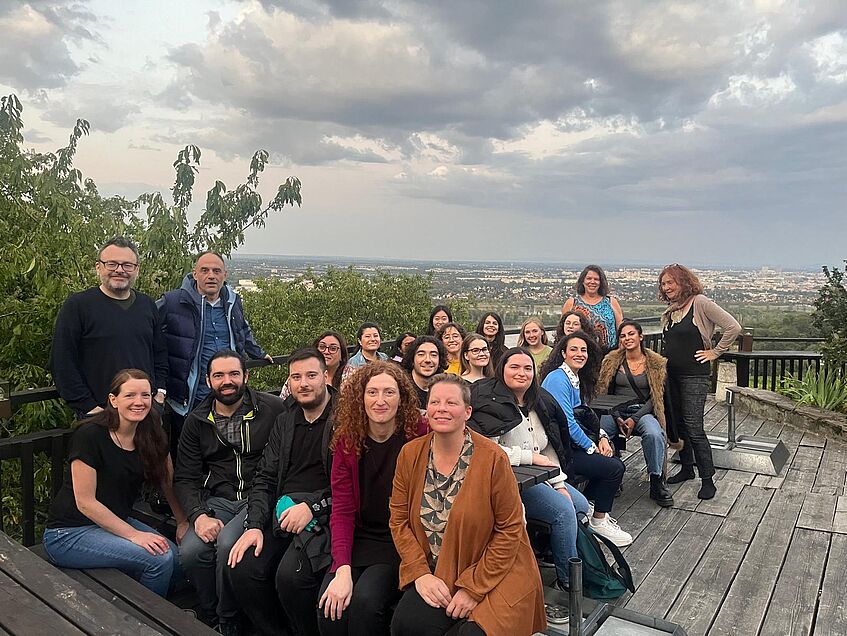
PhD summer school
“Microbial insights into non-CO2 greenhouse gas production and terrestrial biogeochemical cycles under climate change”
About this course
This summer school aims to give an overview of how microbial networks contribute to the production of the GHG methane (CH4) and nitrous oxide (N2O) in terrestrial ecosystems by leading scientists in the field of environmental microbiology. In addition, we will explore how microbial metabolisms are affected by anthropogenic climate change, and the potential consequences and mitigation strategies of anthropogenic perturbations of biogeochemical cycles, with a focus on the non-CO2 greenhouse gases methane and CO2. Lectures will be accompanied by laboratory sessions where the participants will be taught state-of-the-art cultivation methods of key anaerobic and aerobic microbial lineages such as methanogens and nitrifiers, and get hands-on experience with bioreactors. Moreover, we will cover strategies for the characterization of microbial physiologies involved and methods to explore the interplay between the two biogeochemical cycles of methane and nitrogen.
The course will be held in English, starting on Monday 16.09 at 12:30, and ending on Friday 20.09 at 16:30.
Topics covered
- Greenhouse gases (GHG) and climate change
- Microbial metabolisms relevant to non-CO2 GHG production and sinks: methanogenesis, nitrification and methylotrophy
- Interplay between methane and nitrogen cycling
- Microbial physiologies, biogeochemical cycles, host-virus networks and GHG fluxes in rapidly warming ecosystems
- Mitigation of GHG emissions: The case of nitrification inhibitors
Speakers/Tutors
- Prof. Lisa Stein, University of Alberta
- Prof. Stephan Glatzel, University of Vienna
- Prof. Christa Schleper, University of Vienna
- Prof. Dimitrios Karpouzas, University of Thessaly
- Prof. Graeme Nicol, CNRS Director of Research, École Centrale de Lyon
- Assistant Prof. Evangelia Papadopoulou, University of Thessaly
- Dr. Andrea Söllinger, University of Tromsø
- Dr. Christina Hazard, École Centrale de Lyon
- Dr. Henri Siljanen, University of Eastern Finland
- Dr. Logan Hodgskiss, University of Vienna
- Dr. Simon Rittmann, University of Vienna
Research methods and skills covered
- Anaerobic cultivation methods (batch and bioreactor) with a focus on methanogens
- Cultivation of nitrifiers and inhibition profiles, methods for measuring activity and physiological characterization
- Measurement of the GHG gasses CH4 and N2O
Learning objectives
By the end of the course, participants will:
- Have acquired an understanding of the basic physiology of methanogens and nitrifiers
- Have acquired an understanding of how terrestrial biogeochemical cycling (with a focus on methane and nitrogen cycling) contributes to climate change but is also affected by warming
- Have acquired an understanding of GHG fluxes in terrestrial ecosystems
- Have learned the basics of anaerobic microbiology, working with bioreactors and analyzing data from continuous cultures in bioreactors
- Have learned how to cultivate nitrifiers, assess their activity and interpret inhibition profiles
- Have explored the strategic application of nitrification inhibitors as a method to mitigating nitrogen cycling, thereby enhancing their understanding of sustainable agricultural practices.
Target group, capacity and ECTS credits
PhD students and junior postdocs with experience in aspects of environmental microbiology and ecology. Knowledge of microbial physiology concepts advantageous, but all participants are welcome. The course capacity is 12-15 participants.
ECTS credits: 2
Upon successful completion of the program, the Summer School offers a Certificate of Attendance that mentions the workload of 50 hours. Students can apply for recognition of these credits to the relevant authorities in their home institutions, therefore the final decision on awarding credits is at the discretion of their home institutions. We will be happy to provide any necessary information that might be requested in addition to the certificate of attendance.
Format
Morning sessions will involve interactive one-hour lectures with subsequent discussion starting at 9:00am. Afternoon sessions will involve practical hands-on training on cultivation methods of methanogens and nitrifiers and lectures on associated concepts and data handling.
The full programme can be downloaded here.
Venue
University of Vienna Biology Building, Djerassiplatz 1, 1030, Vienna, Austria
Costs and application
The course fee is 190 EUR, covering all lunches and coffee breaks and laboratory materials for the five days of the summer school, including the summer school dinner with all invited speakers on 18 September 2024. The fee does not include accommodation costs, but a list of affordable options will be provided.
To apply, send a CV including a brief description of your current PhD topic and a short motivation statement by 25 August 2024 to Nathalia Jandl: nathalia.jandl@univie.ac.at.


